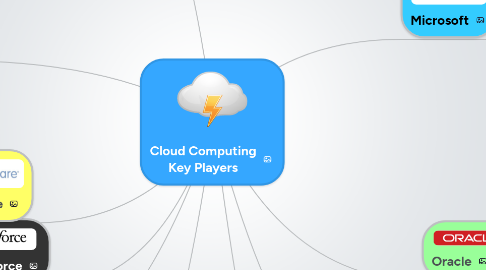
1. SalesForce
1.1. Force.Com
1.2. Databas
1.3. Heroku
1.4. CRM
2. RackSpace
2.1. Hybrid Host
2.2. Cloud Hosting
2.3. Dedicated Hosting
2.4. Storage
2.5. SaaS
2.5.1. Exchange
2.5.2. Sharepoint
3. GoGrid
3.1. Cloud Servers
3.2. Dedicated Servers
4. Amazon
4.1. S3
4.2. CloudWatch
4.3. Elastic MapReduce
4.4. CloudFront
4.5. CloudFormation
4.6. Relational Database Service
4.7. ElastiCache
4.8. Elastic Beanstalk
4.9. Simple Queue Service
4.10. Simple Notification Service
4.11. Identity & Access Management
4.12. EC2
4.13. Route 53 DNS Service
5. VMWare
5.1. CloudFoundry
5.1.1. Open PaaS
6. Joyent
6.1. Smart Data Center
6.2. Smart Machines
7. Microsoft
7.1. Cloud Power
7.1.1. Dynamics CRM
7.1.2. Office 365
7.1.2.1. Sharepoint Online
7.1.2.1.1. Team Sites
7.1.2.1.2. Web site
7.1.2.1.3. Web Apps
7.1.2.2. Exchange Online
7.1.3. Windows Azure
7.1.3.1. Access Control
7.1.3.2. Service Bus
7.1.3.2.1. Queues
7.1.3.2.2. Broker
7.1.3.2.3. EAI Bridges
7.1.3.2.4. Mediation
7.1.3.3. Storage
7.1.3.4. SQL Azure
7.1.3.4.1. SQL Reporting
7.1.3.4.2. Data Sync
7.1.3.5. Compute
7.1.4. Global Foundation Services
7.1.4.1. CDN
7.1.4.2. DataCenters
7.1.4.2.1. Chicago
7.1.4.2.2. Quincy
7.1.4.2.3. Dublin
7.1.4.2.4. Amsterdam
7.1.4.2.5. Singapore
7.1.4.2.6. Hong Kong
8. Google
8.1. Google Apps
8.1.1. 25 GB Storage
8.1.2. Cloud Connect
8.1.3. Gmail
8.1.4. Calendar
8.1.5. Docs
8.1.6. Sites
9. IBM
9.1. IBM Blue Cloud
9.2. CloudBurst
9.3. SmartCloud
9.3.1. Foundation
9.3.1.1. Architecture for Private & Hybrid Cloud
9.3.2. Solutions
9.3.2.1. SaaS
9.3.3. Services
9.3.3.1. PaaS
9.3.3.2. IaaS
9.3.3.3. Backups
10. Oracle
10.1. Private cl
10.1.1. Public cloud
10.1.2. Exalogic Elastic Cloud
